We spoke with Jamia Wilson, executive director and publisher of the Feminist Press, in this installment of the CLMP Member Spotlight series.
What is the history behind the Feminist Press? When was it founded and what was its original mission?
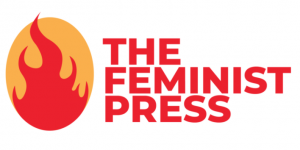 The Feminist Press was founded in 1970 by Florence Howe. Florence was teaching university literature courses at the time, and her students would ask her about books written by women writers. She realized that, beyond the classics written by women like Louisa May Alcott and the Brontë sisters, there were very few books that she was able to recommend to them, simply because many women authors were not being published at the time. The original mission of the Feminist Press was to do this sort of recovery work, publishing texts that had gone out of print not because of any issue with their quality, but because they had been written by women. In its early years, the Press printed books like Rebecca Harding Davis’s 1861 proletarian novella Life in the Iron Mills; Charlotte Perkins Gilman’s The Yellow Wallpaper, published originally in 1891; and Alice Walker’s edited collection of Zora Neale Hurston’s works, I Love Myself When I Am Laughing, and Then Again When I Am Looking Mean and Impressive. This work made the Feminist Press a crucial contributor to the burgeoning women’s studies movement in the United States, as well as both the second-wave and intersectional feminist movements.
The Feminist Press was founded in 1970 by Florence Howe. Florence was teaching university literature courses at the time, and her students would ask her about books written by women writers. She realized that, beyond the classics written by women like Louisa May Alcott and the Brontë sisters, there were very few books that she was able to recommend to them, simply because many women authors were not being published at the time. The original mission of the Feminist Press was to do this sort of recovery work, publishing texts that had gone out of print not because of any issue with their quality, but because they had been written by women. In its early years, the Press printed books like Rebecca Harding Davis’s 1861 proletarian novella Life in the Iron Mills; Charlotte Perkins Gilman’s The Yellow Wallpaper, published originally in 1891; and Alice Walker’s edited collection of Zora Neale Hurston’s works, I Love Myself When I Am Laughing, and Then Again When I Am Looking Mean and Impressive. This work made the Feminist Press a crucial contributor to the burgeoning women’s studies movement in the United States, as well as both the second-wave and intersectional feminist movements.
The Feminist Press celebrates its 50th anniversary this year. How has the press changed and grown over the past half-century?
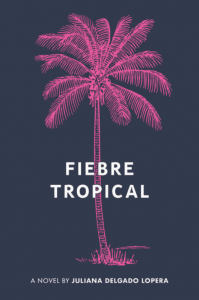 Over the past fifty years, we have continued to honor our legacy as a feminist publisher, while also expanding our scope to keep up with the changing needs of and conversations within contemporary social movements. We are excited about publishing fiction in translation, for example, and in 2019 alone we published three works in translation from three different countries of origin (Bosnia/Croatia, Thailand, and Mauritius/France). We also started our Amethyst Editions imprint with Michelle Tea in 2016, which champions emerging queer writers with genre-bending and experimental narratives. The most recent Amethyst Editions book we’ve published is Juli Delgado Lopera’s Fiebre Tropical, a multilingual coming-of-age story about a queer Colombian girl living in Miami.
Over the past fifty years, we have continued to honor our legacy as a feminist publisher, while also expanding our scope to keep up with the changing needs of and conversations within contemporary social movements. We are excited about publishing fiction in translation, for example, and in 2019 alone we published three works in translation from three different countries of origin (Bosnia/Croatia, Thailand, and Mauritius/France). We also started our Amethyst Editions imprint with Michelle Tea in 2016, which champions emerging queer writers with genre-bending and experimental narratives. The most recent Amethyst Editions book we’ve published is Juli Delgado Lopera’s Fiebre Tropical, a multilingual coming-of-age story about a queer Colombian girl living in Miami.
The Feminist Press is the longest-running feminist publisher in the world, and when you look at the books we have published in the last fifty years, they’re something like a living history of feminism. Feminist Press books don’t align with one singular vision of feminism, but reading them in conversation with one another reveals the different issues, opposing stances, and added nuances that the feminist movement has grappled with. Looking at the growth of the Press and the ways it has changed, in other words, is really a window into how the conversations surrounding feminism have grown and changed since the time that the Press was founded. I love that the Feminist Press is unafraid to complicate conventional narratives, and I hope that the Press continues to uphold that legacy over the next fifty years and beyond. At the time of our founding, many people asked why a feminist press was needed—but in our contemporary moment, the Feminist Press’s fifty years of success show us that our work to diversify publishing and provide a space for conversations about gender, sexuality, race, class, and nationality is still of vital importance.
What are you doing to celebrate this milestone anniversary? How has the COVID-19 pandemic affected these plans?
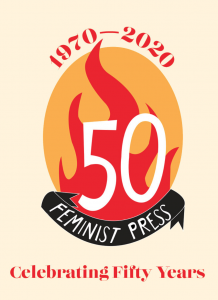
This spring, in celebration of our anniversary and in honor of the Feminist Press’s foundations in feminist recovery work, we reissued Zora Neale Hurston’s I Love Myself When I Am Laughing and Agnes Smedley’s Daughter of Earth, and this fall we’re preparing to reissue Rebecca Harding Davis’s Life in the Iron Mills and Dorothy West’s The Living Is Easy. Unfortunately, our plans for an in-person fiftieth anniversary celebration have been postponed due to the COVID-19 pandemic.
Can you tell us a bit about the Louise Meriwether First Book Prize? Why is it significant to feature this prize in Meriwether’s honor?
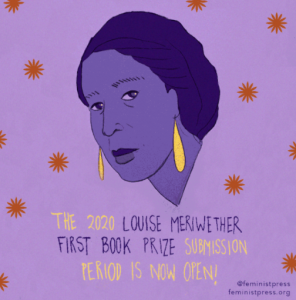 Louise Meriwether is a novelist, essayist, biographer, and activist. Her novel Daddy Was a Number Runner, originally published in 1970 and republished by the Feminist Press six years later, was one of the first contemporary American novels to feature a Black girl protagonist. In 2016, we founded the Louise Meriwether First Book Prize in Louise’s honor; the prize awards the best debut work written by a woman or nonbinary person of color with a publishing contract with the Feminist Press. Meriwether’s legacy, and the publication of Daddy Was a Number Runner, has inspired so many authors who came after her, from Jacqueline Woodson to Bridgett M. Davis. Davis said in an interview that when she first read Daddy Was a Number Runner as a child, she couldn’t believe that someone like her existed in a book, with an interior life and a family that she recognized. When we look at Meriwether’s legacy, it’s clear that there is such revolutionary potential in providing a platform for narratives that speak to experiences that are not represented in mainstream publishing, and that those narratives in turn can inspire new generations of creative expression. We wanted to provide that platform and uplift writers who haven’t yet had the opportunity to break into traditional publishing. The inaugural Louise Meriwether prize winner, for example, YZ Chin, is an immigrant writer from Malaysia whose day job is as a software engineer. This year, we’re excited to be publishing Cassandra Lane’s We Are Bridges, a memoir that interweaves her experience of late entry into motherhood with the story of her great-grandfather’s lynching. It is important to us to be able to honor Louise’s legacy, which the Feminist Press is so lucky to have been able to play a part in, by continuing to make these opportunities available to emerging writers of color.
Louise Meriwether is a novelist, essayist, biographer, and activist. Her novel Daddy Was a Number Runner, originally published in 1970 and republished by the Feminist Press six years later, was one of the first contemporary American novels to feature a Black girl protagonist. In 2016, we founded the Louise Meriwether First Book Prize in Louise’s honor; the prize awards the best debut work written by a woman or nonbinary person of color with a publishing contract with the Feminist Press. Meriwether’s legacy, and the publication of Daddy Was a Number Runner, has inspired so many authors who came after her, from Jacqueline Woodson to Bridgett M. Davis. Davis said in an interview that when she first read Daddy Was a Number Runner as a child, she couldn’t believe that someone like her existed in a book, with an interior life and a family that she recognized. When we look at Meriwether’s legacy, it’s clear that there is such revolutionary potential in providing a platform for narratives that speak to experiences that are not represented in mainstream publishing, and that those narratives in turn can inspire new generations of creative expression. We wanted to provide that platform and uplift writers who haven’t yet had the opportunity to break into traditional publishing. The inaugural Louise Meriwether prize winner, for example, YZ Chin, is an immigrant writer from Malaysia whose day job is as a software engineer. This year, we’re excited to be publishing Cassandra Lane’s We Are Bridges, a memoir that interweaves her experience of late entry into motherhood with the story of her great-grandfather’s lynching. It is important to us to be able to honor Louise’s legacy, which the Feminist Press is so lucky to have been able to play a part in, by continuing to make these opportunities available to emerging writers of color.
You came to the Feminist Press from a career in women’s rights issues. How does your work at the Women’s Media Center, and as an activist and thought leader, influence your editorial vision?
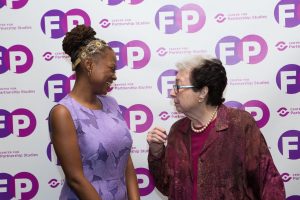
I have been fortunate to be able to contribute to the Feminist Press the media skills I gained from the Women’s Media Center and the movement-building skills I fostered as an organizer working at Planned Parenthood on the political and grassroots advocacy side. Several of the authors we have acquired during my tenure at the Feminist Press are people I have collaborated with in feminist, racial justice, reproductive justice, and other activist and movement spaces. As a result of my experiences, I’m committed to building narrative power for our communities and movements. Our voices matter, and it is an honor to be able to help broaden the reach and platform of initiatives, collectives, and causes that align with the Feminist Press’s values.
What are your hopes and goals for the Feminist Press going forward?
The Feminist Press has always served as the literary vanguard of the feminist movement. As long as there is a need for literature that uplifts insurgent marginalized voices in the service of social transformation, the Feminist Press will be a platform for that literature. In the coming years, I’m excited to see us deepen our existing commitment to our strategic imperatives: organizational excellence, impact, and capacity building. We look forward to continuing and expanding our quest to amplify the voices of trans, disabled, immigrant, and BIPOC authors from the global majority.
